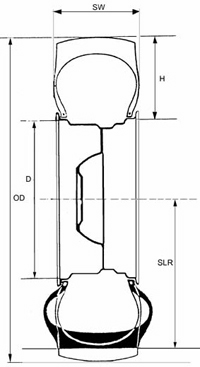![]()
|
TECHNICAL NOTES |
|
|
|
Technical Data Symbols |
|
The following symbols are used in the technical data
charts |
|
Dimensions |
|
Size |
States tyre size designation. |
|
LI - SS |
States tyre Load Index and Speed
Symbol. LI is a code for the tyre load capacity at its nominal maximum speed. SS is a code indicating the tyre nominal maximum speed. |
|
PR |
States tyre ply rating and is
a strength code for the tyre carcass. |
|
Type or |
States the tyre tread symbol
or pattern. If it is a tubeless tyre, the tyre is marked with the symbol
TL after the tread symbol. |
|
New tyre |
States tyre diameter and width
in mm, when the tyre is originally mounted with a nominal inflation pressure.
Since some variation occurs between different versions and manufacturing
batches, the tolerance is stated to +/-1.5% for the diameter and +/-2% for
the width. |
|
SW |
The Section Width of the unloaded
tyre. If the tyre is fitted on a rim which is narrower (or wider) than that
underlined, the section width is obtained by decreasing (or increasing)
the value shown by 40% of the rim width variation (in millimetres). |
|
OD |
The Overall Diameter of the
unloaded tyre. |
|
R.C. |
Rolling Circumference at reference
load and pressure. Distance covered in one complete revolution of the wheel
on an asphalt road. Value in mm measured according to ISO11795. A tolerance
of +/-2.5% is stated to cover variations between different manufacture batches,
climate elements etc. |
|
SLR |
Static Loaded Radius is the
radius from the wheel centre down to the ground, at reference load and pressure.
The difference between unloaded radius and static loaded radius is called
deflection. This value varies between 15-30% of the tyre section height,
depending on tyre type. A tolerance of +/-2% is stated to cover variations
between different manufacture batches, climate elements etc. |
|
SRI |
The Speed Radius Index states
a theoretical value only to be used for calculation of the max speed of
a vehicle according to EU homologation procedures. |
|
Tyre in service |
States the tyre max. diameter
and width in mm that the tyre may reach during its lifetime. These are the
measurements manufacturers should pay attention to when designing new vehicles
and machinery, to obtain adequate clearance for the wheel. |
 |
|
Rim |
| States recommended rim size. Rim width is
expressed in inches e.g. 16.00. A letter symbol in connection with
rim width represents the code for the rim contour. The rim diameter is expressed
in inches. Rim diameters ending with 0.5 (17.5, 22.5 etc.) are 15-degree
rims. Remaining rims are 5-degree (34, 38, 42 etc.). In the table only the rim width is stated. Please check the list of rims included. |
|
Tube |
| States the tube to be used for each size. Example of tube marking: |
|
Agricultural radial tyre: |
38" T 970
|
|
|
Where more than one tube is shown
for the same tyre, pay particular attention to the rim and/or valve type. The type of valve required can be identified from the markings on the tube, using the following codes: |
|
|
|
|
STT brand |
|
|
TWIN brand |
|
|
Speeds |
| The speeds indicated
in the table represent the maximum speed in use for the tyre at the given
loads and pressures. Speed notation in bold types states the nominal speed
for the tyre. nominale del pneumatico. Speed 1 km/h = 0.62 Mph |
|
Free rolling and driving wheel |
|
|
These are
new symbols used for Implement tyres and states freerolling Loadwise, the load capacity is 30% less for driving wheels than for free rolling wheels. |
|
Inflation pressure |
|
The inflation pressures refer to tyres at ambient temperature. The values
given in the tables represent the "reference pressure"
for the load and speed conditions shown. The actual pressure of the tyre
must be established in accordance with the mechanical characteristics
of the vehicle, the additional load from the use of equipment and additional
storage facilities, as well as the load conditions.
|
|
Load capacity |
| The load capacity is the maximum load (expressed
in kg) a tyre is permitted to carry under specified operating conditions. The nominal load is stated in bold type. |
|
|